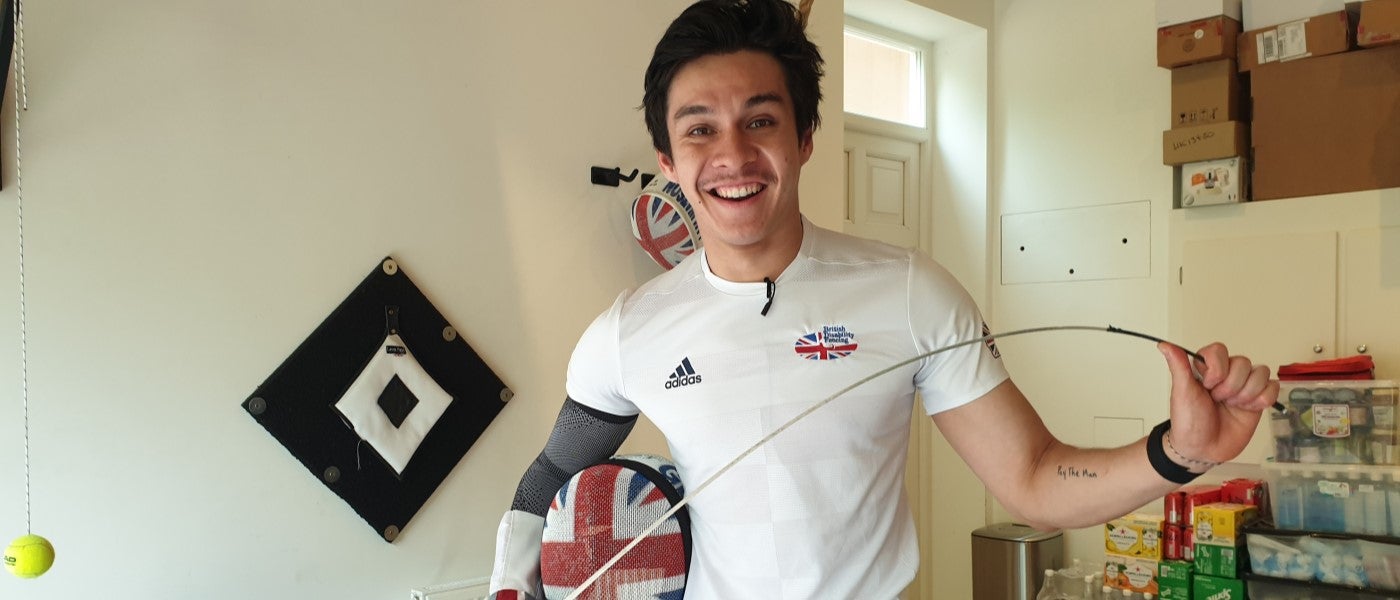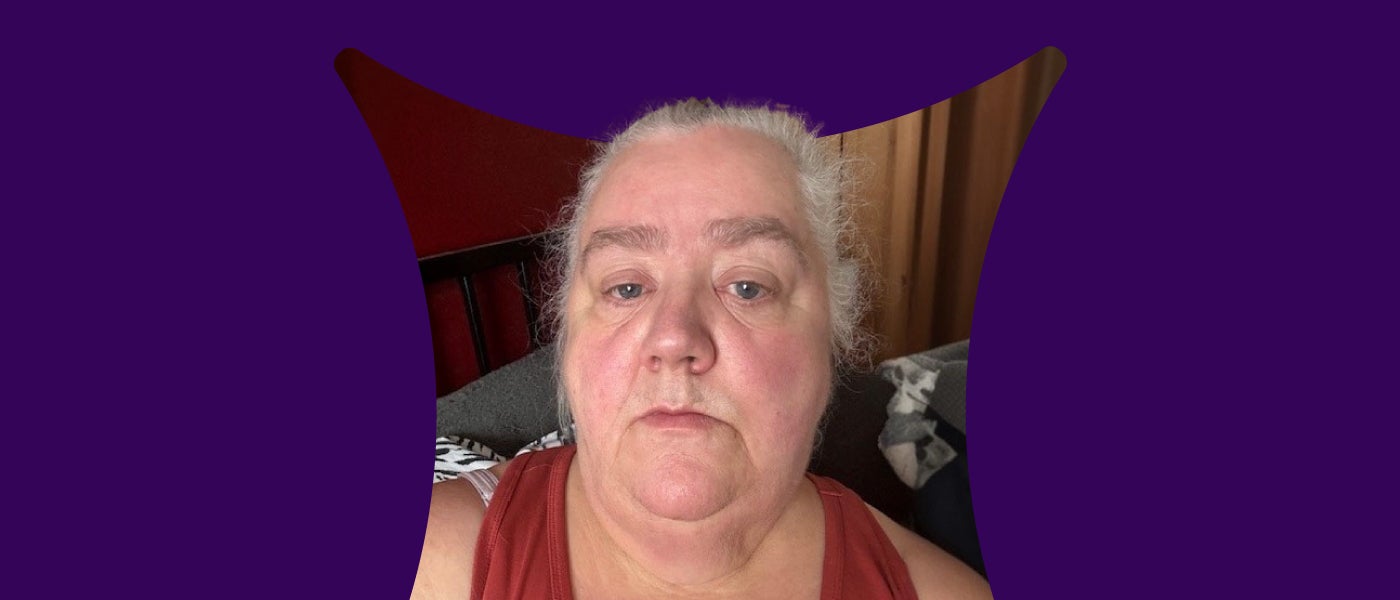- Home
- News and stories
- If disabled people experience judgment for trying a new sport they’re not going to go back
If disabled people experience judgment for trying a new sport they’re not going to go back
 23 August 2021
23 August 2021
With both the Paralympics and our accessible sporting event Make it Count kicking off today, we spoke to ParalympicsGB wheelchair fencer Oliver Lam-Watson about the importance of representation and need for more accessible sporting opportunities.
How has your experience of sport been growing up?
I always hated sport as a kid. It was always something that really highlighted my difference, from being picked last on the playground, to coming last at Sports Days When you’re a child, it’s a lot about the physical, how tall you are, how fast can you run and sport was always a great way to highlight a child’s difference.
Growing up, in terms of representation and parasport, I would see Paralympians on the TV which was very inspirational but at the same time, I always felt as though their success and achievements were the stuff of legend and out of my reach. Being different can be hard at the best of times, and it was so easy as a child to see my disability as negative
How did you get into sport and fencing?
I don’t think I properly acknowledged my disability until right at the end of university, when I was faced with the choice of amputation. Then I began to realise that this was a condition I would be living with for the rest of my life.
The amputation surgery would have been potentially dangerous so I decided to keep my leg and that’s the first moment I really came to terms with my disability.
At the end of university, when faced with the possibility of amputation, my doctor told me “either way, you’ll never run or walk normally, and you’ll never be an athlete”. After this I sat with the idea of what it is to be disabled and what living life to the full looks like as a disabled person. I wanted to find out what I was capable of.
So, I tried going for runs and going to the gym. I signed up for a spartan obstacle course and I didn’t know if I could even do it but I signed up, so I could be the one to decide.
And I completed it, and signed up for a few more. I became really hungry for it, flying round the world to do these races and courses. But after a while I felt the lack of real competition as you get a medal for just completing. I wanted something more.
Around this time I went to see a doctor about my heart. The doctor asked me what sport I did and I said I do these races on my crutches and he said “well that’s not really sport is it”. He shouldn’t have said it but it really stuck with me.
Then I thought, If I do a Paralympic sport, no one can tell me I’m not an athlete. I googled Paralympic sport and found wheelchair fencing. I rang every place that offered fencing in London. 80% said they don’t offer wheelchair fencing, 10% were closed but I found one that would train me.
I did a lesson, decided I liked it and that I was going to see how far I could go with it. I bought all the kit and trained really hard, almost as much as I do now as a full time athlete. Six months later I was selected for the first international team.
My first world cup was amazing, I was walking around seeing people I’d been googling. I was fencing people I had watched on TV. Now I’m going to be competing in the Paralympics in Tokyo.
Have you had any experience of sport not being inclusive?
Aside from people thinking I’m mad to do obstacle courses, I’ve had bad experiences at gyms as well. I’ve heard someone saying “Since when do people on crutches go to the gym?”.
If someone else injures themselves or drops a weight in gym no one bats an eyelid, but if a disabled person does it people think “What an idiot, why did he think he could do that”.
“There are lot of people who are really insecure about their disability, and if they experience any judgment from people for trying a new sport they’re not going to go back. These are barriers created by society.”
Have you faced barriers outside of sport?
People have preconceptions of what a disabled person should be. When I went to get my blue badge, I got denied first time round, because I apparently wasn’t disabled enough to have a blue badge.”
You’re either too disabled or not disabled enough. I’m apparently too disabled go into a club but not disabled enough to get a blue badge.”
When I parked in a disabled pay a parking attendant told me I couldn’t park there and I said “how do you know I’m not disabled? The parking attendant “you don’t look disabled” to which I replied “what does a disabled person look like?.”
How has the Paralympics impacted you?
London was a huge one. It was great to see parasport get so much attention. In previous years there was a real disparity in the coverage and attention between the Olympics and Paralympics.
Social media coverage for London and Rio was amazing because of the human aspect, it showed the athletes as people, showed their training, their journey, their lifestyle.
One thing I struggled with growing up, was that there were no disabled role models for me, that could inspire me. But media representation as improved and hopefully now the attitudes towards disability have changed a lot. The Paralympics are an amazing symbol of inclusivity that tell the world that we are all athletes, and that really changed since 2012.
What would you say to people who feel discouraged from sport and activity?
“As a young disabled person I always felt like I had to be better than everyone else just to be seen as equal”
“I think the number one thing is not caring about what other people think of you. Don’t be afraid to fail and don’t take advice from people. So many people told me to quit fencing. Take it easy, slow down is something people say to disabled people because they think they know your body better than you.
“The only person who knows whether you can or can’t do this is you. So go and find out.”
Do you feel like disabled people have equal opportunities to get active? What needs to change?
Absolutely not, and it starts at school! My teammate is world number one, and he was offered wheelchair fencing at school. How many champions could we have in this country if we had more sport to offer disabled kids? The Paralympics is an example of more people seeing parasport, wanting to get involved and then creating the demand. It’s also an opportunity for people to see how cool and interesting and impressive parasport is.
 23 August 2021
23 August 2021







